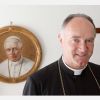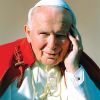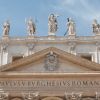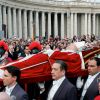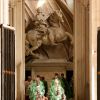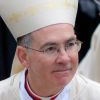VATICAN CITY - To help bishops determine the credibility of alleged Marian apparitions, the Vatican has translated and published procedural rules from 1978 that had previously been available only in Latin.
The "Norms regarding the manner of proceedings in the discernment of presumed apparitions or revelations" were approved by Pope Paul VI in 1978 and distributed to the world's bishops, but never officially published or translated into modern languages.
VATICAN CITY - The Italian television journalist who set off the "VatiLeaks" controversy by releasing private letters to Pope Benedict XVI and between Vatican officials has published a large collection of leaked documents in a new book called "Your Holiness."
In a statement May 19, Jesuit Father Federico Lombardi, Vatican spokesman, called the publication of the letters for commercial gain a "criminal act" and said the Vatican would take legal action.
"The latest publication of documents of the Holy See and private documents of the Holy Father can no longer be considered a questionable -- and objectively defamatory -- journalistic initiative, but clearly assumes the character of a criminal act," Father Lombardi said.
VATICAN CITY - Reconciliation talks between the Vatican and the Society of St. Pius X have not reached their conclusion but will continue, the Vatican said May 16, after members of its doctrinal congregation examined the latest communication from the head of the breakaway traditionalist group.
"Some observations were formulated which will be kept in mind in further discussions," said Jesuit Father Federico Lombardi, Vatican spokesman, following a meeting of the Congregation for the Doctrine of the Faith.
ROME - Much of the recent news from Rome deals with matters that, though important, will have minimal effect on the life of the Church as a whole. The negotiations with the Society of St. Pius X, the admission of former Anglicans to full communion, even the doctrinal assessment of one of the leadership associations of American women religious — all of these items are at the margins, rather than the centre, of the universal Church. The Society of St. Pius X has a significant presence in only a few countries, the former Anglicans in even fewer and the congregational leadership subject to doctrinal assessment represents an aging and rapidly diminishing component of American religious life.
Yet one recent piece of news is potentially of great significance for the daily life of the Church throughout the world. The Holy See announced last week reformed statutes for Caritas Internationalis, the global umbrella group of various Catholic development agencies.
VATICAN CITY - In an effort to boost recruitments through more modern methods of outreach, the Pontifical Swiss Guard has opened a page on Facebook.
Facebook.com/gsp1506 was launched May 4 "to open a window" and better inform young people about the "Guardia Svizzera Pontificia," said the guard's commander, Col. Daniel Anrig.
VATICAN CITY - A Vatican decree established new statutes and norms for Caritas Internationalis, giving Vatican offices, including the Secretariat of State, greater authority over the work of the Vatican-based umbrella group of Catholic aid agencies.
The decree strengthens the roles Vatican offices and the Pope play in working with the charity confederation, including naming and approving new board members and approving its texts, contracts with foreign governments and financial transactions.
VATICAN CITY - Ten years after a historic papal response to clerical sex abuse, the Vatican urged priests to strive for greater holiness in their own lives so that they might effectively minister to others and reverse the tide of atheism.
In its annual letter to priests for 2012, the Vatican's Congregation for Clergy focused on Blessed John Paul II's 2002 Holy Thursday letter to clergy, in which the late pope responded to the growing revelations and scandal of sexual abuse of minors by priests.
VATICAN CITY - The co-founder of Wikipedia told a Vatican audience that his online encyclopedia could contribute to peace by promoting "a more thoughtful world," even as the site was under fire for how it referred to those who oppose and support legalized abortion.
Jimmy Wales, who co-founded Wikipedia in 2001, was invited to address the annual assembly of the Pontifical Academy of Social Sciences. The meeting at the Vatican April 27-May 1 focused on Blessed John XXIII's 1963 encyclical "Pacem in Terris" and continuing challenges to promoting peace and justice in the world.
VATICAN CITY - The global financial crisis and the worldwide recession it triggered have demonstrated that allowing financial markets to self-regulate does not serve national interests and the good of the international community, a Vatican official said.
"The international community cannot let the financial system continue being a source of global economic instability; it must urgently take measures to prevent the outbreak of other financial crises in the future," said Archbishop Silvano Tomasi, the Vatican's permanent observer to U.N. agencies based in Geneva.
The archbishop made his comments April 22 during a top-level meeting of the U.N. Conference on Trade and Development, which was being held in Doha, Qatar. His office distributed the text of his speech April 25.
VATICAN CITY - Pope Benedict XVI named the members of a papal commission he established in March to investigate a series of leaks of letters exchanged among Vatican officials and between the officials and the Pope himself.
Spanish Cardinal Julian Herranz, 82, a former president of the Pontifical Council for the Interpretation of Legislative Texts, will lead the commission. The two other members are 88-year-old retired Slovakian Cardinal Jozef Tomko, prefect emeritus of the Congregation for the Evangelization of Peoples; and the retired archbishop of Palermo, Cardinal Salvatore De Giorgi, 81.
VATICAN CITY - The cameras are trained on the cute baby being foisted up to the pope for a kiss and papal blessing, not on the dapper gentleman trying to handle the precious, often squirming, load with care.
Vatican ushers attend every weekly general audience, helping visitors with special needs and picking out the cutest babies in the crowd for the photo op of a lifetime. And they welcome dignitaries and heads of state visiting the pope with all the pomp and circumstance suited for their stature as "gentlemen in waiting."
These laymen, called "sediari" or chair-bearers, did just that for centuries: carried the pope on an elevated chair high above the crowds so everyone could catch a glimpse of the pontiff.
But Blessed John Paul II discontinued the practice when he was elected in 1978, preferring to walk and be close to the people.
The "sediari" stayed on, but their role no longer included carrying the pope on their shoulders -- until Blessed John Paul's death more than 26 years later.
When he died, Blessed John Paul's body had to be carried by 12 papal gentlemen on a red velvet stretcher in a solemn procession from the Apostolic Palace to St. Peter's Basilica.
Because so many of the papal ushers were young, only a few older veterans knew how to carry a pope either on the portable chair or the stretcher.
All ushers' eyes and ears were on Massimo Sansolini, who served four popes after he became a "sediario" in 1964.
He spelled out the correct procedure for smoothly and decorously lifting and carrying the papal platform so that it would stay as horizontal and secure as possible while the men navigated corridors and numerous marble staircases.
Two of his essential rules: "Carry it with just the shoulder, without help from the hand" and always begin walking with the left foot.
The rules were in his recently published Italian memoir, a follow-up to a volume he published in 1999 in which he told of his life as a papal gentleman, revealing the not-often-seen world of the Apostolic Palace, at the service of the pope.
Sansolini told reporters at the second book's launch April 23 that because there were always 12 "sediari" helping the pope -- the vicar of Christ -- he always felt like one of the apostles -- a servant of the servant of God.
In his book, he described how hard the men tried to remain calm and composed, fighting back the tears, as they transferred the pope's body before the crowds April 4, then carried the cypress casket from St. Peter's Basilica outside to the square during the April 8 funeral.
"No layperson had ever been as close to the sacred person of the pontiff as we had for 26 years straight," he wrote.
While those events briefly put Sansolini and his confreres in the world spotlight, their weekly routine is much less visible.
For the past 16 years, Sansolini has been in charge of helping disabled pilgrims get seating as close to the pope as possible during Wednesday general audiences and other special occasions.
There are special sections in the square or the Paul VI audience hall for church dignitaries, important guests, newlyweds and people with special needs. All the ushers also have their eyes open for parents with tiny infants and help them get as close as they can to the barricade in the general seating section to pass the baby to the pope in the popemobile.
Sansolini said no pope has ever complained about the tradition of individually greeting and blessing the disabled after the general audience, no matter how scarred or infirm they may be: "The pope's love knows no limits."
A typical Wednesday starts very early as Sansolini arranges the seating for the disabled section, leaving room for the wheelchairs between the plastic chairs for the caregivers.
Guests are asked to arrive a couple of hours early before the start of the audience so they can clear security and find their section.
Sansolini said he helps pass the time with all of them, chatting about their lives in whatever language they have in common. Sometimes, he said, just a caress or smile is all that it takes to forge a strong bond.
He said he has been humbled by the heroism of the mothers, fathers and caregivers of the gravely ill and physically or mentally challenged adults and children he sees every week.
"There are women like Mother Teresa all over, on every continent," caring for the unwanted or abandoned.
He said he is always touched by people he meets, from those afflicted with terminal cancer to Iraqi children bearing battle scars, "their tiny bodies, already martyred" in the bloom of their life.
Once he saw a mother come to the audience hall laden with bags and cases, which she scattered on the floor around her.
He was going to gently say something about the disarray, but let it go. He was glad he did, he wrote, because later she pulled out a series of bottles and a syringe and proceeded to feed her child through a stomach tube.
"Every time I am present at an audience I come out with greater faith" from witnessing the unconditional love, joy and hope in people, he said.
"The love of a parent overcomes everything! The human being reaches a fullness of dignity that knows no limits" when it overcomes all challenges and suffering with love and grace, he wrote.
VATICAN CITY - For Vatican historians, the roots of a Christian idea of religious liberty go way back: in fact, back 1,700 years to the Emperor Constantine's victory on Rome's Milvian Bridge and to his conversion.
At a Vatican conference in late April marking the anniversary, the head of the Pontifical Committee for Historical Sciences said Constantine's victory in 312 under the sign of the cross was "the foundation of a new world" marked by religious freedom for Christians and separation between church and state.
VATICAN CITY - Citing "serious doctrinal problems which affect many in consecrated life," the Vatican announced a major reform of an association of women's religious congregations in the United States to ensure their fidelity to Catholic teaching in areas including abortion, euthanasia, women's ordination and homosexuality.
Archbishop J. Peter Sartain of Seattle will provide "review, guidance and approval, where necessary, of the work" of the Leadership Conference of Women Religious, the Vatican announced April 18. The archbishop will be assisted by Bishop Leonard Blair of Toledo, Ohio, and Bishop Thomas Paprocki of Springfield, Ill., and draw on the advice of fellow bishops, women religious and other experts.
VATICAN CITY - Almost 30 years after the still-unexplained disappearance of a teenage girl who lived with her family at the Vatican, the Holy See continues to be willing to cooperate with efforts to solve the mystery, the Vatican spokesman said.
Jesuit Father Federico Lombardi issued a three-page statement April 14 recalling how often Pope John Paul II appealed for the release of Emanuela Orlandi after her presumed kidnapping in 1983 and how top Vatican officials formally answered investigators' questions then and in subsequent investigations carried out in the late 1980s and mid-1990s.
The Vatican's Justice council targets business leaders
TORONTO - Though we all participate in the global economy by buying things and services, it’s pretty hard to take personal responsibility for globalization — but somebody has to, says the Vatican.
The Pontifical Council for Justice and Peace has issued a kind of digest of Pope Benedict XVI’s latest encyclical and aimed it squarely at business leaders. “The Vocation of the Business Leader” is a 30-page booklet aimed at business professionals mentoring young employees and professors in business schools. It extensively quotes and summarize Benedict’s encyclical Caritas in Veritate.




